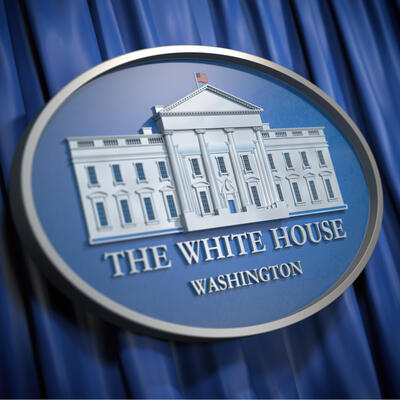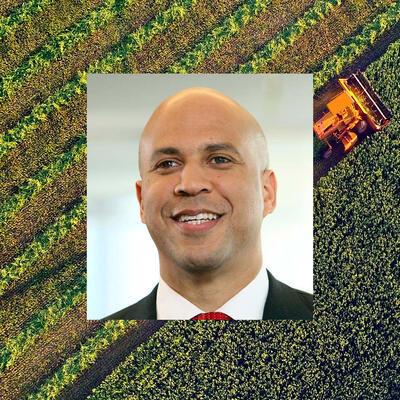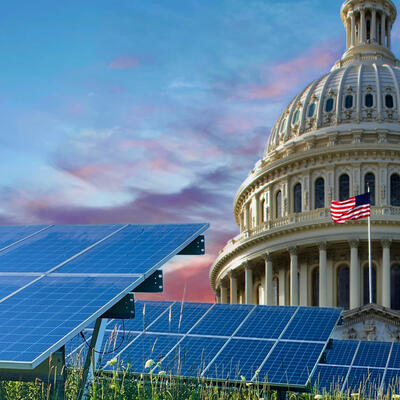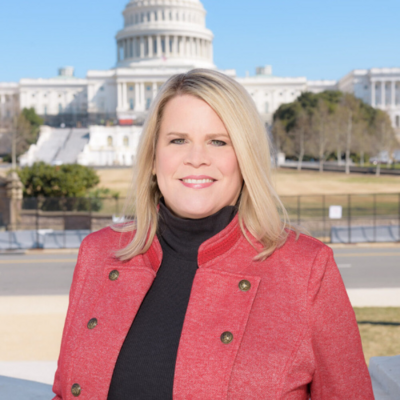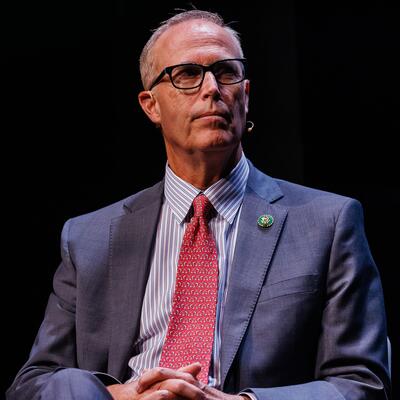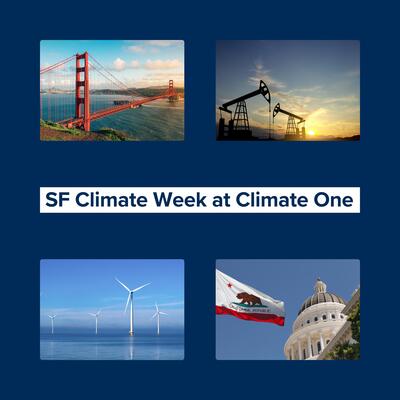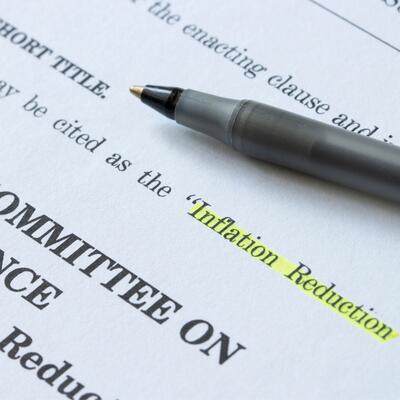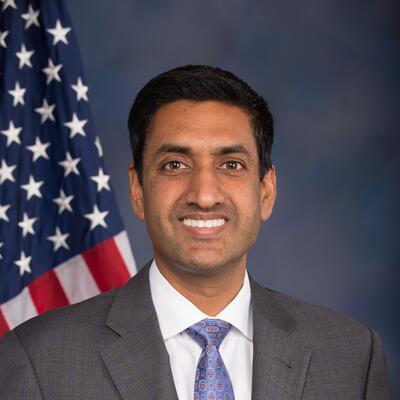
Rep. Ro Khanna on AI, Misinformation and Holding Big Oil Accountable
Guests
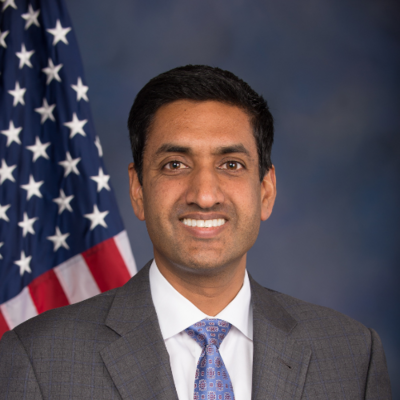
Ro Khanna
Summary
The U.S. is in the midst of yet another election season, with the presidential primary campaigning well underway. Now that big pieces of legislation like the Infrastructure and Jobs Act, the CHIPS Act and the Inflation Reduction Act have become law, the upcoming elections will help determine how those laws are implemented – and whether they will be built upon or scaled back. The climate stakes are high.
Congressman Ro Khanna rose to prominence as a vocal progressive who actually gets things done in Congress. He got more bills passed than any other Democrat during the previous administration.
In 2021, as chair of a subcommittee of the House Oversight Committee, Khannapresided over historic hearings where the CEOs of the big oil companies testified under oath about climate misinformation their companies were responsible for. Khanna compared the hearings to the Big Tobacco hearings of 1994. “For many, many decades these oil companies knew that burning fossil fuels causes climate change. Their scientists have the most up-to-date science and yet they’d have executives go out and mislead the American public.”
At one pivotal moment in the hearings, Khanna asked the oil company CEOs if any of them would stop funding theAmerican Petroleum Institute’s disinformation campaign. The response? “There were crickets,” Khanna says. “I was hoping a few of them would at least say yes, we agree with you; API shouldn’t be engaged in climate disinformation.”
In March, the Biden Administration approved a controversial oil drilling project in Alaska's National Petroleum Reserve known as the Willow Project. The approval caused a significant outcry among climate and environmental activists. The administration claimed that its hands were tied because ConocoPhillips, the company behind the Willow Project, had already purchased the right to drill in that area. But recently the administration made the decision to permanently ban oil and gas drilling on 10 million acres in the reserve. It also plans to cancel seven leases the previous administration issued for the Arctic National Wildlife Refuge. Khanna is a vocal critic of the Willow Project. He says, “There was no reason for the administration for the Department of Interior to approve that; it was a mistake.”
Congressman Khanna was also instrumental in working with Senator Joe Manchin’s office during negotiations over what would eventually be the Inflation Reduction Act. He was the only progressive to do so, at a time when other progressives were raging against Senator Manchin who saw him as standing in the way of President Biden’s Build Back Better agenda.
Khanna represents Silicon Valley and came into office with backing from big tech executives who are known for their hostility toward labor unions. Despite that, he is a staunch supporter of labor unions. Khanna says, “When I was in the Obama administration I had advocated for unionization at Tesla. I said we should be conditioning the Treasury Department funding to allowing Tesla workers to unionize.”
Looking to the implementation of the big legislative climate wins, Khanna is worried about losing aspects of the Inflation Reduction Act if Republicans gain control of Congress and the presidency. He says, “The stakes are too high to move backwards. We have had progress. We finally have climate front and center in Washington. We need to build on that progress.”
Episode Highlights
4:58 - Ro Khanna on the historic big oil congressional hearings
11:40 - Ro Khanna on fixing energy policy
18:21 - Ro Khanna on the Willow Project
21:28 - Ro Khanna on banning the export of US Oil
25:54 - Ro Khanna on working with members of congress who don’t share his views
27:57 - Ro Khanna on the UAW strikes
32:20 - Ro Khanna on Tesla and Unions
34:42 - Ro Khanna on what the IRA gets right and what can be improved
41:20 - Ro Khanna on communicating values
46:10 - Ro Khanna on misinformation and the 2024 election
Resources From This Episode (6)
Full Transcript
Note: Transcripts are generated using a combination of automated software and human transcribers and may contain errors. Please check the actual audio before quoting it.
Greg Dalton: This is Climate One. I'm Greg Dalton.
Ariana Brocious: And I'm Ariana Brocious.
Greg Dalton: Well, the first presidential primaries are just three months away, and I'm starting to think about what the election might mean for our climate.
Ariana Brocious: I don't want to go through another election cycle. I feel like at this point they are just never ending, and they are so negative most of the time, and there's a lot of stuff that just kind of dominates the news cycle.
Greg Dalton: Right, and divides us, and it seems like every election is the most important one of our lifetime, and yet this, there's a lot at stake for the climate and energy and a lot more. And with elections, now come fake news and misinformation campaigns trying to sway voters on social media.
Ariana Brocious: Yeah, and it's actually kind of frightening how successful some of those strategies are. Just in the renewable space alone, there have been wind and solar projects delayed or even canceled because of misinformation on social media. So it's kind of amazing how much people can be swayed.
Greg Dalton: And it's disturbing that a lot of the social media companies have laid off people recently that are content moderators whose job is to find out and suppress misinformation.You know, a little doubt can go a long way in keeping people clinging to fossil fuels. People are wary of change, and uncertainty favors the status quo. On today's episode, I have a conversation with someone who's uniquely positioned to speak about the intersection of misinformation, artificial intelligence and climate disruption.That's Democratic Congressman Ro Khanna.
Ariana Brocious: Congressman Khanna represents California's 17th district, which includes much of Silicon Valley and the first Tesla factory.
Greg Dalton: And I toured that factory years ago when it was a dark, abandoned, former GM and Toyota factory. A new assembly line was being installed for this little company that was just starting to make cars called Tesla. I was surprised by his comments about Tesla and unions. Tesla's status as a non union automaker, which gives it a cost advantage, is a big factor in the UAW strike now against GM, Ford, and Stellantis.
Ariana Brocious: And what surprised you about his comments about Tesla?
Greg Dalton: He came into office with backing from big tech executives who are known for their hostility toward labor unions. So I thought with a big factory in his district, I was a little surprised how clearly pro union he was taking the side of workers rather than the big company in his district.
Ariana Brocious: Yeah, Khanna won his seat from an eight term incumbent Democrat, who was supported by California's political establishment and labor unions. So Khanna is kind of known as a pragmatic progressive.
Greg Dalton: He is, and that irks people sometimes. He worked with Joe Manchin's office during negotiations for what eventually would become the Inflation Reduction Act at that time, progressives and many Democrats were raging against Joe Manchin.
Ariana Brocious: Yeah, he was. It's seemingly standing in the way of a lot of climate legislation. In 2021, Khanna was chair of a subcommittee of the House Oversight Committee, and he brought some attention to the role social media platforms play in spreading disinformation about fossil fuels and clean energy.
Greg Dalton: That role of social media companies doesn't get a lot of attention in the energy conversation. Images of wind turbines on fire are one example of smear campaigns on social media that sow doubt about renewables. And in fact, renewables are safe and clean.
Ariana Brocious: And maybe the more well known thing he's done recently is that Khanna presided over historic hearings where big oil executives testified under oath about their company's role in climate misinformation. This was a big deal.
Greg Dalton: It was a big deal. Let's hear a moment from the hearing when Congressman Kana asked Exxon CEO Darren Woods if the company would admit that it was a mistake when a former CEO denied the link between burning fossil fuels and climate change.
[PLAYBACK]
Ro Khanna: When I make a statement that's wrong, that most people make a statement that's wrong, they say, okay, it's a mistake. We regret it. I'm just asking you for that. You, I assume now that it's a false statement, that the company regrets making it and would acknowledge that, right.
Darren Woods: I think the expectation would be that we'd, we'd look at that at the time it was said and years ago that wasn't the case.
Ro Khanna: But forget, forget whether it was consistent or not. Can you just acknowledge that it was a mistake to make? If someone makes a mistake, just say it was a mistake. And, and you regret that that statement was out there. Would you say that?
Darren Woods: I don't think it's fair to judge something 25 years ago with what we've learned since that time.
Ro Khanna: I'm disappointed that you're not even willing to say that something is a mistake.
Greg Dalton: I have two things to say about that. First, the basic science of greenhouse gasses goes back a century and scientist Edward Teller warned the oil industry about that in the 1950s.
Ariana Brocious: So Exxon knew.
Greg Dalton: Totally Exxon knew. Second, if Exxon CEO Darren Woods makes the admission Khanna was seeking, the company could be legally liable.
Ariana Brocious: But that’s exactly the point, isn’t it? That Congressman Khanna and others believe Big Oil should be liable for the harm its products have caused.
Greg Dalton: It is indeed the point. Oil companies are trapped by decades of deceit, and that’s what made these hearings so compelling and interesting.
Ro Khanna: Well, it’s a historic hearing similar to the big tobacco hearings. Until then these big oil CEOs had never been brought to the United States Congress to explain their lies about the cause of climate change for many, many decades these oil companies knew that burning fossil fuels causes climate change. Their scientists have the most up-to-date science and yet they’d have executives go out and mislead the American public. So we threatened to subpoena them and we got all of the big executives in front of us and millions of documents where they more or less admitted that in the past they had misled the American people about burning fossil fuels and the cause of climate change. And we try to hold them accountable for their statements. A lot of that the evidence that we discovered is now part of efforts by activists in litigation to hold these big oil companies accountable.
Greg Dalton: And there's an amazing moment in that hearing where you go and kind of, for that kind of nicotine is not addictive moment where you tell the big oil CEOs they could stop funding the American Petroleum Institute's disinformation campaign
[PLAYBACK: You could tell them to knock it off. For the sake of the planet. Would any of you take the opportunity and look at API and say ‘stop it? ANY of you??”
Greg Dalton:What did you expect would happen and what happened in that moment?
Ro Khanna: Well, there were crickets. I was hoping a few of them would at least say yes, we agree with you, API shouldn’t be engaged in climate disinformation. But these big oil companies have become very sophisticated. They don't engage directly now in the climate disinformation they used to in the past, just tell outright lies. Now they have a third-party group that is doing the campaign to spread this misinformation to try to block legislation. They have a fee on methane or to block climate legislation ending fossil fuel subsidies. They let the American Petroleum Institute do their advocacy, put out misinformation and they fund these groups and it’s a really cynical strategy.
Greg Dalton: The committee released a report detailing some of that strategy. What do you believe are some of the most important takeaways from those millions of documents that you obtained?
Ro Khanna: The most important takeaway’s that these companies still they have not come clean. I mean they were plotting against Sunrise kids when the Sunrise Movement was mobilizing and talking about how they could stop these kids from activism. They are continuing to mislead the American public now is claiming that they are clean companies and yet devoting a very small fraction of their budget actually to clean technology. They talk about “regulating” Scope 1 or Scope 2 emissions which are basically the emissions coming out of their actual facilities. But not the emissions that are caused by the burning of oil or gas themselves, which is the vast majority of emissions. So these companies are continuing to engage in misinformation and there was no accountability.
Greg Dalton: Well, what personal responsibility do, I drive electric cars, I don't know what you drive or for people who fly and do burn fossil fuels. Isn’t there some also personal responsibility? I mean, I understand that there's deception from the suppliers. But what's the responsibility of individuals?
Ro Khanna: Oh, I think there is obviously some responsibility to have carbon offsets or to live responsibly. But I don't think that this issue is an individual responsibility issue. I mean when you said, well, let’s recycle or let's do small things. This is a systemic issue where you had certain corporations make billions of dollars on basically being able to pollute the climate. And what we really need is policy, a macro policy that is gonna change that. The most important thing being massive investments in renewable energy is in public transportation. But the second thing being having some price on carbon. And if we have that kind of price on carbon, then we don't have these negative externalities. So I think it's important for all of us to be conscientious but it's really a societal issue.
Greg Dalton: Big oil companies like BP are now reducing their promise to reduce emissions given their $27 billion in profits in 2022. Others are also walking back their emission reduction goals as well. They’re also doing what the stock market incentivizes them to do, right, they’re making profits. That's what they're in the business to do and that's what, you know, some retirees who own oil and stock companies for their dividends are investing them to do. So what do you say about that they're just responding to the market doing what they're supposed to do?
Ro Khanna: Well, first I say that we need to stop subsidizing them. I mean the US taxpayer shouldn’t be giving them the kind of depreciation tax exemptions and tax credits that we do. So we have all these kind of subsidies. Those need to stop. The second thing is that they need to be transparent. It's fine for them to be able to make a profit, but they shouldn't be making profits by misleading the American public. Either there should be an accountability for the past lies that some of these companies have told and there should be a check on what they're saying about their climate goals and whether they’re meeting them. I mean they have to have transparency. And the third thing is they should not be allowed to have excess profits in making an advantage in taking advantage of a war. So a lot of these companies after we went to war with Ukraine started to have extraordinary profits in a time of emergency. And that's why a proposal with Sheldon Whitehouse, the windfall profits tax saying you can't just have these record profits at a time where Americans are hurting.
Greg Dalton: Right. And there's been a lot of talk about reducing subsidies globally fossil fuel subsidies were $7 trillion in 2022 or 7% of GDP according to the IMF. I just want to say that again, 7% of GDP is fossil fuel subsidies. US is one of the biggest offenders, though politicians live in fear of drivers angry about gas prices. If fossil fuel subsidies go away there could be some increase in fossil fuel prices that leads to angry voters, Yellow Jackets in France etc. Is there a political system really ready for that?
Ro Khanna: Well, one, we could stop the export of oil. We used to have the ban on the export of oil from 1973 to 2015. That would reduce CO2 emission and it also would help with gas prices. Second, there are ways of having some price and carbon without having the working-class and middle-class suffer. You could tax the large corporations and provide a dividend to the working and middle class from that taxation to make sure that the burden is really falling on those who are profiting. And I don't think that ending some of these subsidies would really drive up the price of gas at the pump. These companies are making record profits. And the challenge on the price of the pump was the decisions in Ukraine, the war in Ukraine and the Saudi decision to cut in OPEC. And that's where we need to be tougher and that we shouldn’t be exporting our oil.
Greg Dalton: I interviewed a board member of ConocoPhillips earlier this year. And he would say actually that oil companies are not very good at making money. While they have some years like 2022 eye-popping profits, there are some years, they lose a lot of money. And critics of the industry often look at the profitable years and ignore the years where they lose money. And over time, you know, this is Arjun Murti, he’s on the board of ConocoPhillips is actually oil companies are not so good at making money. So, you know, are you cherry picking your timeframe there and if you look broadly they don't make as much money, you know, they make a lot they lose a lot over time.
Ro Khanna: Well, that's an argument for diversification of these companies into renewable energy. And it is an argument for American consumers of why we want to transition to a less volatile energy supplies. I mean we don't want a situation where you got three bucks gas going up to 4, 5, 6 bucks gas and wildly fluctuating profit. So that is an argument for why we shouldn’t be subsidizing the oil and gas industry and should be having more investment in renewable energy.
Greg Dalton: So what's happening now? You're in the minority. Republicans are in control of the House. They have a very different agenda. They got this project 2025 looking at setting an agenda for Republican agenda if they win the White House next year. So how’s the energy landscape shifted now that you're in the minority and Republicans are in charge of the House?
Ro Khanna: Well, there’s no attention to the climate. I mean my committee was disbanded. The committee I chaired where we had the historic hearings on big oil now no longer exist is now called the energy subcommittee where the goal is just to see how you can have unimpeded support for the big oil and gas industry. So there is no talk about emissions. There's no talk about the 162 million greenhouse gases that are emitted every day. It is just a denial of climate.
Greg Dalton: You represent Silicon Valley, you know, your family traces back to India. There’s been horrific heat impacts in India. We’ve seen what happened in Maui. The Canadian wildfires. How have you personally experienced the impacts of climate change from Pakistan around the world, it seems like every day we open the paper there's something happening.
Ro Khanna: Well, the impacts haven’t just been international, they've been local. I mean, obviously the wildfires in California have been awful. The smoke in Washington DC from the Canadian wildfires has been devastating. I have had people I know in Vermont in New Hampshire who have flooding. And then it’s just been heartbreaking to see what's happened in Hawaii. And you point out that there are drought conditions in other parts of the world and this is gonna hurt, particularly farmers in our ability to produce enough food in different parts of the world. So climate change is already taking place. We’re seeing the consequences. And the real question is are we finally gonna have the will to act. I mean I was very disappointed with the decision to have the Willow Pipeline, which is one of the largest oil projects on public land. I mean that is just a punch to the gut for those of us who believe that we need to be investing in renewable energy and transitioning away from an entrenched fossil fuel future.
Greg Dalton: On Climate One today, a conversation with Rep. Ro Khanna. If you missed a previous episode, or want to hear more of Climate One’s empowering conversations, subscribe to our podcast wherever you get your pods.
Ariana Brocious: Please help us get people talking more about climate by giving us a rating or review. You can do it right now on your device. You can also help by sending a link to this episode to a friend. On our new website you can create and share playlists focused on any topic.
Greg Dalton: Coming up, young voters are demanding politicians do more to address the climate crisis.
Ro Khanna: They are right to be angry at Washington not doing enough to recognize the climate crisis or to take the types of action we need which is to end the fossil fuel subsidy. Declare a climate emergency. Stop drilling on public lands.
Greg Dalton: That’s up next, when Climate One continues
Greg Dalton: This is Climate One. I’m Greg Dalton
Ariana Brocious: And I’m Ariana Brocious.
Greg Dalton: In March, the Biden Administration approved a controversial oil drilling project in Alaska's National Petroleum Reserve known as the Willow Project. The approval caused a significant outcry among climate and environmental activists.
Ariana Brocious: Yes, though the administration claimed that its hands were tied because ConocoPhillips, the company behind the Willow Project, had already purchased the right to drill in that area.
Greg Dalton: Joe Biden was elected to restore the rule of law. Still, environmentalists say this commits us to burning more fossil fuels at a time when we need to be dramatically cutting emissions.
Ariana Brocious: But recently the administration made the decision to permanently ban oil and gas drilling on 10 million acres in the reserve. It also plans to cancel seven leases the previous administration issued for the Arctic National Wildlife Refuge.
Greg Dalton: Which means the administration is doing what it said it couldn't do when it approved Willow. Let’s get back to my conversation with Congressman Ro Khanna, who is a vocal critic of the Willow project.
Ro Khanna: The president ran on saying no new drilling on public lands. No new oil drilling there. Yet the Conoco could have taken the administration to court and the authority may have been challenge and we could've seen how it would have resolved. But there was no reason for the administration for the Department of Interior to approve that; it was a mistake.
Greg Dalton: Right. But there is definitely a shift. Do you think that the Biden administration is worried? What I've heard is they have a problem with young voters who turned out for him in 2020 and they look at Willow and saying, you know, there’s already an enthusiasm gap for Joe Biden’s administration. Are you concerned about young climate conscious voters turning out in ’24?
Ro Khanna: I am. They really were disappointed with the Willow project. They really were disappointed with Mountain Valley Pipeline. Which is a shame because the Inflation Reduction Act was such a win, such a win for climate. The fact that the president is trying to create the Climate Civilian Core through executive order is a win for climate. But these moves were really unforced errors and they sent a very disheartening message to young activists. And when I meet young activists it’s one of the first things they bring up. And so we need to address it, and I'm glad the administration is taking corrective action.
Greg Dalton: You mentioned young activists. There’s a group called Climate Defiance and we’ve seen recently people gluing themselves to airplane runways, you know, disrupting even going after Democrats governor of Massachusetts, etc. I saw a video on Instagram or TikTok where they actually were more friendly toward you. There's a growing somewhat radical youth protest movement because they're scared and they don't see change happening. How do you see that Climate Defiance group and those kinds of more confrontational protests even going after Democrats?
Ro Khanna: I respect them. I mean they’re nonviolent protests. So obviously I don't agree with anything that crosses the line into violence or vandalism. Climate Defiance has been perfectly peaceful. All they’re doing is disrupting a speech or a hearing to make their point. And they are right to be angry at Washington not doing enough to recognize the climate crisis or to take the types of action we need, which is to end the fossil fuel subsidy. Declare a climate emergency. Stop drilling on public lands. These are very commonsense demands that a lot of the young folks have. And they’re frustrated that we haven't been able to do that even with a Democratic administration.
Greg Dalton: Right. The president says he effectively has declared a climate emergency though that doesn't unlock kind of the emergency powers. But, you know, some of those people that are being targeted by young protesters say, hey, we’re the good guys we’re doing as much as we can within the constraints that we have, you know because we have to worry about, I don’t know, swing voters, suburban women in ‘24 who might be, you know don't want prices to go up or are more moderate. Do you recognize a line the administration is trying to walk there looking at the whole political landscape and swing moderate suburban voters?
Ro Khanna: No, because I think one of the things that a climate emergency would allow them to do is put a ban on exporting oil, which is a Richard Nixon policy in 1973 in which we had until 2015. And the reason that was overturned was basically a handout to big oil companies to be able to export this oil for massive profits. And that is increasing the export, the climate carbon footprint, but it's also raising the price of gas because we’re selling it on a global market instead of domestically. So I believe there are solutions that both are good for American consumers and also good for the climate. The Willow project had nothing to do with swing voters. All of that, even by ConocoPhillips would be used for export. It's not gonna help reduce the price and it's years and years down the line. So my sense is that these are areas where we wouldn't be losing swing voters and could be standing with the climate activists.
Greg Dalton: In the first half of 2023, the US became the world's largest exporter for liquefied natural gas. Now a massive new LNG export terminal called CP2 is proposed for the Louisiana coast. Bill McKibben wrote about this in The New Yorker. It would have 20 times a lifetime emission of the Willow project underway in the Arctic that you mention. The US Department of Energy is expected to approve or deny an expanded export permit for CP2 this fall. What's at stake and what should the Biden administration do?
Ro Khanna: It would be a big mistake for them to approve a carte blanche export license there. This is as Bill McKibben writes the fight for like the Keystone Pipeline. And young activists are already paying attention to this. It's one thing to have some liquefied natural gas going to our European allies in a time where we have a war in Ukraine. But we don't need something that's going to have these 20 times the impact and it's a horrible message on reducing emissions. What the climate activists are saying is it's not enough just to have investments in electric vehicle battery plants and investments in solar and wind. That we can't continue to entrench and build new fossil fuel infrastructure and expect that CO2 emissions are going go down or that we’re gonna make any dent in the 162 million number of greenhouse gas particles that we emit every day.
Greg Dalton: Right. Though some would say that's really investors problem whether they gonna invest in that facility or not. Investors might lose money if that gas becomes unburnable on markets there. Is it really the government to say, you know, tell people whether you’re gonna win or lose on that? Granted, the International Energy Agency has said we don't need more fossil fuel infrastructure. We don't need to discover more. There are already enough fossil fuels on the balance sheets of these big companies to fry our home. So it does seem to be insanity to continue doing it. But isn’t that the choice of companies in a free market to do it?
Ro Khanna: Well, it would be the choice of company if it was appropriately priced. But the companies are bearing the gains of selling liquefied natural gas or the oil out without the cost of the harm they're doing to the environment than all of us. And that's because there's no price on carbon. And so if there were an appropriate price then you’d have a functional market. But you don't, and that's why the government has to step in. And this president has said that he did not want more public drilling, drilling on public lands. I'm not sure on the CP2 if that's in private land or public land. But the administration should be taking actions to stop further entrenching fossil fuel infrastructure that is clearly destructive to the environment.
Greg Dalton: Sen. Joe Manchin who was frustrated a lot of people in his own party and sort of scaling down and shaping what became the Inflation Reduction Act. You say that there is a place for Joe Manchin in the Democratic Party. How do you approach him and other Democrats from fossil fuel states, you know, Robert Byrd before him? Jon Tester is facing a tough fight in Montana. You’re part of the Progressive Caucus in the House. How do you see moderate Democrats who are in perhaps a different place on fossil fuels and climate than you are?
Ro Khanna: Well, first of all we need to recognize that the voters get to decide who to send up here and we've got to work with who comes here to make progress. And that's why for almost a year I was the only one Democrat in meetings with Joe Manchin and bipartisan meetings saying whatever is going to come in the Inflation Reduction Act, Manchin’s gonna have to sign off. That was just the reality. And when a lot of other people in the progressive world in the House even some in the White House said, written them off, I was there some criticism on my left saying, no, we’ve got to work with him, we've got to figure out how to do it. And I give Sen. Schumer credit for pulling that deal together. And where I say I played some role is then to get progressives to help support that deal that Schumer and Manchin came up with. Had we not done that we wouldn’t have had any of the Inflation Reduction Act. So I do believe we have to work in the system we have to make progress and that's why often described as progressive was reasonable or wants to compromise to get things done. One more point, we have a massive investment in places like West Virginia places that are traditionally fossil fuel states in new industry disproportionate investment to incentivize them for making this kind of a transition.
Greg Dalton: As we record this President Biden is joining a UAW picket line in Michigan. Donald Trump is going there tomorrow. We have this kind of interesting theater with presidents joining UAW striking workers on strike against GM and Stellantis the owner of Dodge and Jeep Fords, you know, seems to be on a path toward some kind of deal a little bit to the side here now. But workers are concerned about EVs that require fewer workers to build fewer parts, fewer mechanics to take care of them. So how do you address the organized labor demands and the real concerns about this transition to electric vehicles and job security?
Ro Khanna: I was out there in Wayne, Michigan and Toledo, Ohio with the United Auto Workers. And I'm proud of them standing up for fair wages. And it's wonderful actually in this country that we have a president and a former president, both rushing and eager to go there. I mean I believe President Biden has done a lot more actually for workers. But it just shows the sympathy that America has for the workers. Here's what I’d say about electric vehicles. Obviously, it takes less autoworkers to make an electric vehicle. And even if you factor in the battery plant and the supply chains it’s still probably less. But the reality is electric vehicles are going to exist. They’re a percentage of the global market. We can debate whether they’re gonna be 50%, 30% 20% 10%. No one really knows. But there are certainly gonna be a significant percentage. You yourself said you have an electric vehicle. So the question becomes, should those electric vehicles be made in the United States or in China. In my view, they should be made in the United States and they should have good union jobs. Then yes, if you want to make internal combustion engines while those are being made those are good jobs. So the new jobs for this new market should be American jobs and pay well. And that's the debate with UAW at the heart of the debate is should these battery plants should the electric vehicle supply chain be unionized. I believe it should.
Greg Dalton: Though a lot of the investment as, you know, is going to the southeast and right to work states. And the Biden administration through Inflation Reduction Act try to have some domestic content rules, labor rules, etc. But the reality is that, you know, even Ford and some of these US companies are moving to the southeast where there is unions or if not outlawed, make very difficult. That’s just where the industry is going, right. And there’s a concern that this strike could make Ford and Stellantis a unionized car less competitive against other companies.
Ro Khanna: Well, the master agreement would cover those plants in Kentucky and Tennessee and the south. And that's why it's important that they get the master agreement the UAW. In terms of the competitiveness. I mean you have record profits for the big three. You’ve got CEOs that are making $30 million a year. You've got $5 billion in stock buyback. So it's hard for these companies to plead poverty or competitiveness when the workers took massive cuts in 2008 and still haven't been made whole and people see these record profits of these companies. I do believe the administration should have had more safeguards to make sure that if you’re gonna get taxpayer money there needs to be the right to organize. There need to be prevailing wages.
Greg Dalton: Are you concerned about, say, partnering with companies from China as Ford has done?
Ro Khanna: I am, especially if the labor standards aren’t being met. And if the workers aren’t getting a fair wage, I mean, there are also alternative companies that Ford and other companies can look at. Look, there are two competing issues. One is that we have as strong and robust green transition. And the other is how do we have workers paid appropriately and with dignity. And I don't think that in the rush to just try to achieve one goal we can overlook the other goal. Because if you don't have workers buy-in, then you're not gonna get the support public support for the clean policies, clean energy policies. And Shawn Fain and I wrote an op-ed saying the two big challenges of our time are income inequality and the climate crisis. We need to tackle both the Gen Z for change groups, the young voters on climate recognize that. If you go to their social media pages, you'll see some of the strongest support from Gen Z voters for the UAW workers.
Greg Dalton: The largest EV manufacturer in the world is Tesla whose first factory is in your district. The California Department of Fair Housing and Employment sued Tesla last year, alleging discrimination against black workers who are severely underrepresented in the ranks of executive senior officials and managers. Company’s faced other litigation regarding worker safety. As a person who represents Tesla workers presumably if you live around that Fremont factory, how concerned are you about Tesla and its place in this ecosystem and its labor practices?
Ro Khanna: Well, when I was in the Obama administration I had advocated for the unionization at Tesla. I said we should be conditioning the Treasury Department funding to allowing Tesla workers to unionize. And I was outspoken about that and I have remained outspoken about it, and it is unfortunate that the Tesla workforce hasn’t unionized. That's a real concern in this electric vehicle transition.
Greg Dalton: Legacy auto companies and even oil and gas companies have more diverse workforces than some of the solar and what’s called clean energy companies. So where's the US making progress on that front bringing workers, workers of color into this new economy so that they’re not left behind. President Biden, you know, has this Justice40 Initiative trying to put a lot of placement on that. What do you think is happening and where does more work need to be done?
Ro Khanna: Well, we need to make sure that these funds that are going from the IRA are going to places that are union-friendly towns that are going to communities of color. And the investments are going into cities that have large diverse populations. And that we have to be intentional about that, and we need to be intentional in the funds for workforce training. And metrics in measuring that so that we don't just have all of this funding go without any concern about the geography or the inclusivity of the support.
Greg Dalton: This is Climate One. Coming up, what would a Green New Deal for Health mean for victims of climate disasters?
Ro Khanna: We need to have that kind of a infrastructure so that when there are climate emergencies people can get the health care that they need. We don't have that. We didn't have that with the flooding in Vermont. We didn't have that with the emergency that we saw in Hawaii. (:16)
Greg Dalton: That’s up next, when Climate One continues.
Greg Dalton: This is Climate One. I’m Greg Dalton. The Inflation Reduction Act is the biggest energy and climate bill this country has ever passed. It’s a huge bill and success will depend on how it's implemented. In my conversation with Congressman Ro Khanna, I asked him what the law gets right and where it can be improved.
Ro Khanna: It was a historic investment. I mean the largest investment ever. I think it does an incredible job in getting solar and wind and electric vehicle and battery plants off the ground in the United States. What it needs to improve is more labor checks so that the money shouldn’t have just been going without conditions for allowing the right to unionize, allowing for prevailing wage. And there needs to be more scale of the investment. I mean to put it in context it's $300 billion over 10 years. Our defense budget in the same time will be close to eight or $9 trillion. So it's an investment. But it still dwarfs the investments we’re making in our military when the climate crisis is a huge existential threat. And we need to have more investment in public transportation and also ending the fossil fuel subsidies and taking policy. So we aren’t just entrenching new fossil fuel infrastructure which the Inflation Reduction Act didn’t really address.
Greg Dalton: Implementation of the IRA the Inflation Reduction Act is going to be critical to meeting US emission reduction goals. About 43% the EPA believes the law is capable of. But what are some of the obstacles are buried you see to implementing the IRA because certainly there are Republican governors who and others who may not be so invested in the success of it.
Ro Khanna: One is the workforce. I mean we need to have training and investment in making sure that we have the workforce to be able to do all the new industrialization that is there. Second is to make sure that the wages are good and that people have the right to organize and bargain so that these new jobs are considered good jobs not just a numerical job but a job that can be family supporting for the middle class. And third, that there is accountability and that we're monitoring the timelines of these projects and not getting delayed in bureaucracy and red tape. So that the American people know we’re capable of doing big things. I mean the Empire State building, most famously was built in a year. And there was a sense at one point in time that America could do big things fast. We've got to have that same kind of urgency. When Gov. Shapiro got the I-95 correctly built after the huge storm in a few weeks there was such a national pride because we weren’t used to that. And we need to be able to do that at the federal level.
Greg Dalton: Utah Republican John Curtis is chair of the Conservative Climate Caucus in the house. He’s less concerned about getting all fossil fuels and I am and we had a good conversation recently on the show. Do you talk to him do you think you can find common ground with conservatives and other Republicans on energy and climate?
Ro Khanna: It’s been hard on climate. I talked and work with Republicans all the time. I work with Nancy Mace on child care. I work with Marco Rubio on economic development. I guess one place there is possible common ground is on the steel bill that I'm talking about. Build new steel plants in America for national security. And it just so happens that those things will have a lower carbon footprint. But if you lead with the Republicans with less lower carbon footprints they’ll probably walk away. If you say let's produce things in America build things in America. They may be open to it and then it turns out the new technology is better on CO2 emissions. The other places, clean air, clean water, let's get PFAS out of communities. Those arguments also can appeal sometimes to more Republican leaning voters and members of Congress who come from a tradition of sometimes stewardship of the land stewardship of the air from a faith tradition. I mean my faith in terms of my Hindu faith is certainly one of respect for the world and planet that we live in and all living organisms that there is a divinity to that. And other faith traditions have the same kind of reverence for the land and the water and our obligation to it. And that is a language that sometimes finds common ground with Republicans.
Greg Dalton: I think language is key and often a barrier that we use it, that language be some coded, you know, you could do a lot about climate if you don't use that C word and use other words.
Ro Khanna: Well, I talk about production and new industrialization and the opportunity to build new things because those are values that many Americans have that Republicans have too. I talk about being stewards of the land and stewards of the planet that we've inherited and responsible stewards about it. I talk about clean air and clean water and healthy communities which we all want. I also acknowledge that there’s genuine room for debate that a lot of times these are values issues and you can't just as scientists have the last word. A lot of time what we’re debating is the probability risk of some really bad consequence worth avoiding and the cost of it may be some economic short-term tax or short-term cost. And that's a values question. It's not simply a scientific question. And a lot of times I think when the other side when you disguise a values question for a scientific question and call people ignorant of science when really, they’re expressing a desire for different values it’s not as persuasive and it actually has the perverse consequences of politicizing science. So a lot of times my view is we should be debating the values and not just hiding behind the science. A lot of that was COVID, I mean, I was very much for masking and I was for a shutdown when it happened. But those are values decisions. Those are saying I’m comfortable with those decisions and that trade-off. It wasn't just a scientific question.
Greg Dalton: That's different than what we often hear from the left, which is, you know, march on science defend science. The reality is most Americans don't know a scientist, don't ever talk to a scientist don't particularly like or fondly remember high school chemistry and physics. So you’re saying talk about values. Science is important, but don't lead with science which is a lot of climate conversations, people are waving that climate stick.
Ro Khanna: Well, this comes from the sense of how do we understand science in a democracy. Of course, we need more scientific literacy. Of course, we need more climate literacy in our schools and people should have that. But we run the risk of politicizing science when we lead with the scientist. Instead scientists should be experts that people can look to but there should be a recognition of values. Then we can make the argument about why we should care about these issues.
Greg Dalton: The Biden administration recently issued a directive requiring the US federal government which purchased $600 billion in goods and services annually to include the social cost of carbon and construction purchasing and other activities. This is kind of a wonky number but it's basically some of the extra turnout we’re talking about earlier the social cost, Biden has set the new number reportedly close to $190 a ton more than four times what it was in the Obama years. So how important is the social cost of carbon and how do you explain it to people because it’s kind of hard to follow.
Ro Khanna: That’s a big step by the president. Sheldon Whitehouse, the senator from Rhode Island, has been pushing this for years. And all it says is that when you're doing business with the federal government, we should look at what the actual cost of what you're selling is. And that's not just the price you're charging. But it's also the carbon that you’re emitting into the atmosphere. And the federal government has huge influence because we’re a big purchaser of goods and services. And so if we can help incentivize people to lower their carbon footprint. that can have a dramatic impact on CO2 emissions in the United States.
Greg Dalton: In April of 2023, you and Sen. Ed Markey introduced the Green New Deal for health. Green New Deal is kind of a rallying cry. It seems to be not really active policy inside Washington. Can you explain what the Green New Deal for health contains and why you're proposing it now.
Ro Khanna: All the Green New Deal means as I understand it, is that we need massive reindustrialization and development in the United States that can lower the carbon footprint. And there's this opportunity as we have to make the new steel new aluminum new cement to do so and processes that will actually lower the carbon footprint and create jobs. With the Green New Deal for health, it actually was a bit prescient, and we did it in April of 2023. And then you have the awful heartbreaking tragedy in Maui. And you saw the need for healthcare systems and emergency response systems to be adaptive to climate emergencies. We don't have that. We didn't have that with the flooding in Vermont. We didn't have that with the emergency that we saw in Hawaii. We didn't have it fully on the storms we saw in Florida. So this is just saying that we need to have that kind of a infrastructure so that when there are climate emergencies people can get the health care that they need.
Greg Dalton: Right. And those costs are just soaring. And we don't seem to sort of, people don't personally feel that cost. They think it comes from, I don’t know, Uncle Sam's pocket somehow that's not related to their taxes. How long can the federal government continue to run to the rescue of these disasters that are happening with increased intensity and frequency?
Ro Khanna: Well, that’s exactly the point of why we need the climate investment. Because if we don't have these investments the cost of these catastrophes is gonna be far more. Now people say, well, even if we do it, what about China, what about India, what about the rest of the world? Well, America will lead. We always have lead. And that leading shapes the markets shape the behavior of other countries, especially if we end up including a carbon tax at the border. We can really shape global markets to reduce global emissions. We are the largest economy in the world. And especially working with Europe we can have that kind of impact.
Greg Dalton: And speaking of the global impacts of this. Climate is obviously a global issue. Vladimir Putin has weaponized fossil fuels in his invasion of Ukraine, you referenced that earlier. Republicans have gone squishy on supporting the Ukrainian people defending their homeland and public support for US funding is softening. The AI tools in deep fakes are much more sophisticated than they were in the 2016 election. Is that on your radar this potential what some people, Scott Galloway, a podcast who I listen to and others have said, there’s a coming wave of Russian disinformation on oil and gas motivated by Ukraine and aimed at the US election.
Ro Khanna: I'm very concerned about the Russian disinformation. I’m concerned about Chinese disinformation. When I was in Taiwan there was so much concern about Chinese propaganda. And there’s gonna be concern about Russian propaganda in the United States. And that's why we need to have some rules adopted by Congress about the use of deep fakes, about the use of AI for propaganda and disinformation. And we need our federal agencies FTC, FEC to try to have those rules before 2024. I fear we can barely keep the government open. It's gonna be hard to come to that consensus with Republicans who may have an incentive in doing anything to aid the Trump campaign. But we really need to have some rules of accountability.
Greg Dalton: So as we look forward, you know, there’s concern about Russian disinformation energy and this clean transition is gonna be very much at the center of the election, as you see with Donald Trump and Joe Biden going to Michigan this week. You know, how do you think that energy is gonna play out in the 2024 election?
Ro Khanna: We are going to have new energy sources in the world. That is obvious. The question is, will America lead in them or are we going to say, well, we just want to lead in oil and gas and let China and other countries lead in the new energy sources. That has never been the American way. That would be like saying well, we should just continue to lead in the analog world and let China lead in technology. What a colossal mistake that would have been. I want America to lead in the clean energy race. I want those jobs to be good paying union jobs or high-paying jobs in communities. And I want us to help re-industrialize and reinvigorate this country's economic prosperity with this opportunity that we made a mistake by hollowing out our middle-class working-class industrial base. Now we have this opportunity to rebuild it in a way that has a lower carbon footprint. Let's take this opportunity not just to tackle climate but to transform the economy in a way that’s gonna uplift people like the UAW autoworkers who are striking. And that's why that strike is so critical. These new EV jobs these new solar jobs. These new climate jobs have to be good paying jobs and they have to be at least as good as the old jobs.
Greg Dalton: And a lot of those jobs are happening in red districts, even perhaps represented by members of Congress who voted against that. But there's gonna be a significant effort to repeal, to claw some of that back. What are you most concerned about losing in the IRA if it gets, you know, rolled back?
Ro Khanna: I’m most concerned about losing some of the tax incentives for electric vehicles that could just shut down or reverse the market. I'm concerned about losing the funding for new solar and wind plants. I'm concerned about losing the incentives to invest in new clean technology. And if we had that happen, if we had Donald Trump come and had a Republican House and Senate, and that was set back. It could set us back decades because the cleantech investors and the private sector will say we can’t trust Washington they do one thing and then they'd take it away. Let's stay away from this industry. So that's really what's at stake. That's what I tell my friend, my younger climate activist friends whose frustrations I share about Willow and Mountain Valley Pipeline and the expansion of oil drilling in the IRA. And who I believe are right to be demanding climate emergency. I say the stakes are too high to move backwards. We have had progress. We finally have climate front and center in Washington. We need to build on that progress.
Greg Dalton: Congressman Ro Khanna, thanks for coming on Climate One today and sharing your insights. We appreciate it very much.
Ro Khanna: Thank you. Really appreciate you having me.
Greg Dalton: Climate One’s empowering conversations connect all aspects of the climate emergency. To hear more, subscribe wherever you get your pods.
Ariana Brocious: POD version: Climate One’s empowering conversations connect all aspects of the climate emergency. Talking about climate can be hard-- AND it’s critical to address the transitions we need to make in all parts of society. Please help us get people talking more about climate by giving us a rating or review. You can do it right now on your device. You can also help by sending a link to this episode to a friend. On our new website you can create and share playlists focused on topics including food, energy, EVs, activism. By sharing you can help people have their own deeper climate conversations.
Greg Dalton: Brad Marshland is our senior producer; Our managing director is Jenny Park. Ariana Brocious is co-host, editor and producer. Austin Colón is producer and editor. Megan Biscieglia is our production manager. Wency Shaida is our development manager, Ben Testani is our communications manager. Our theme music was composed by George Young (and arranged by Matt Willcox). Gloria Duffy is CEO of The Commonwealth Club of California, the nonprofit and nonpartisan forum where our program originates. I’m Greg Dalton.
